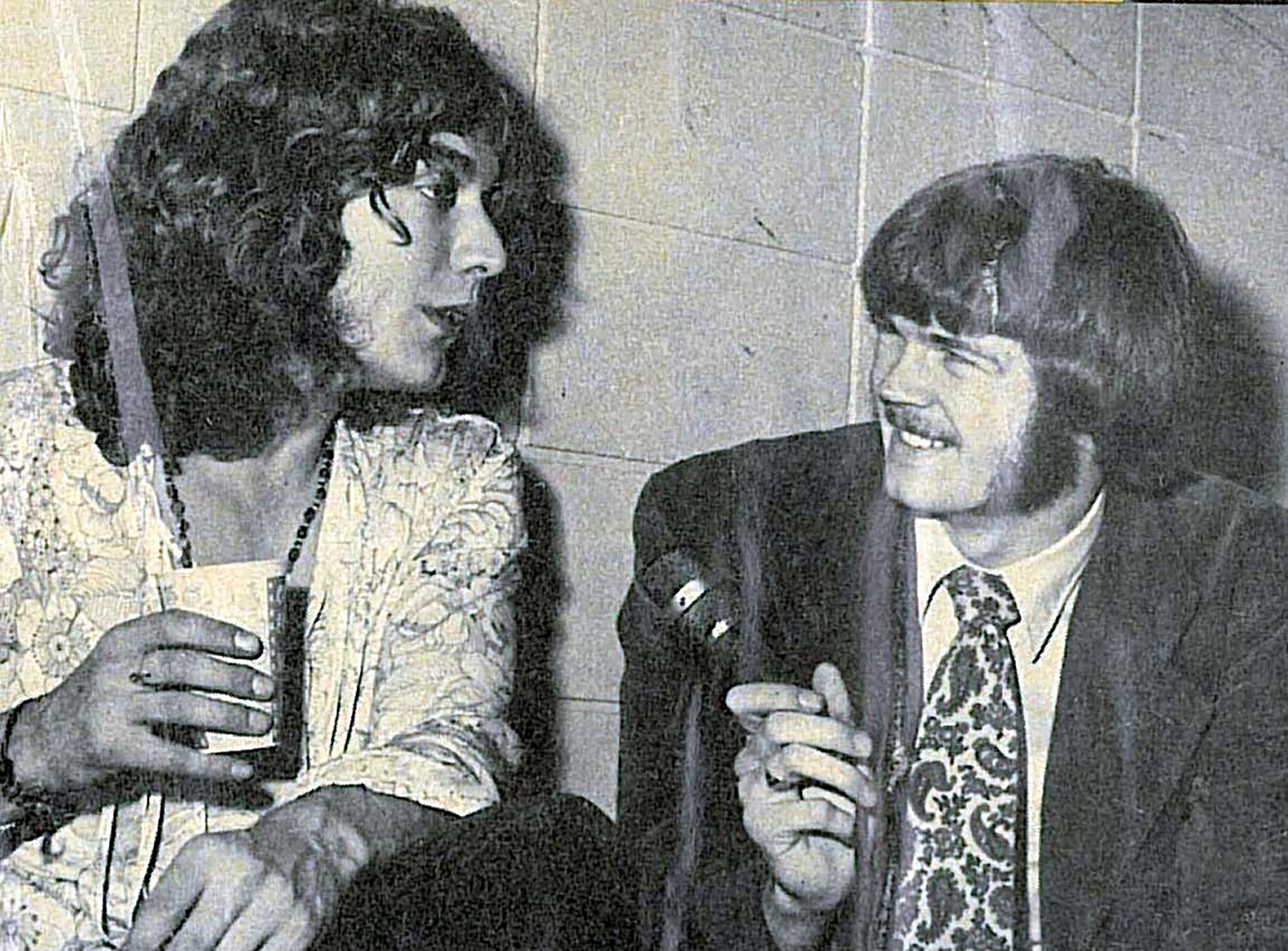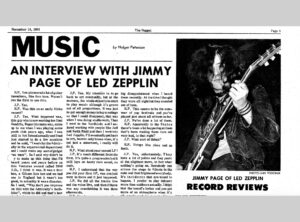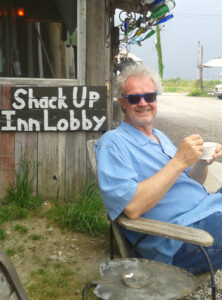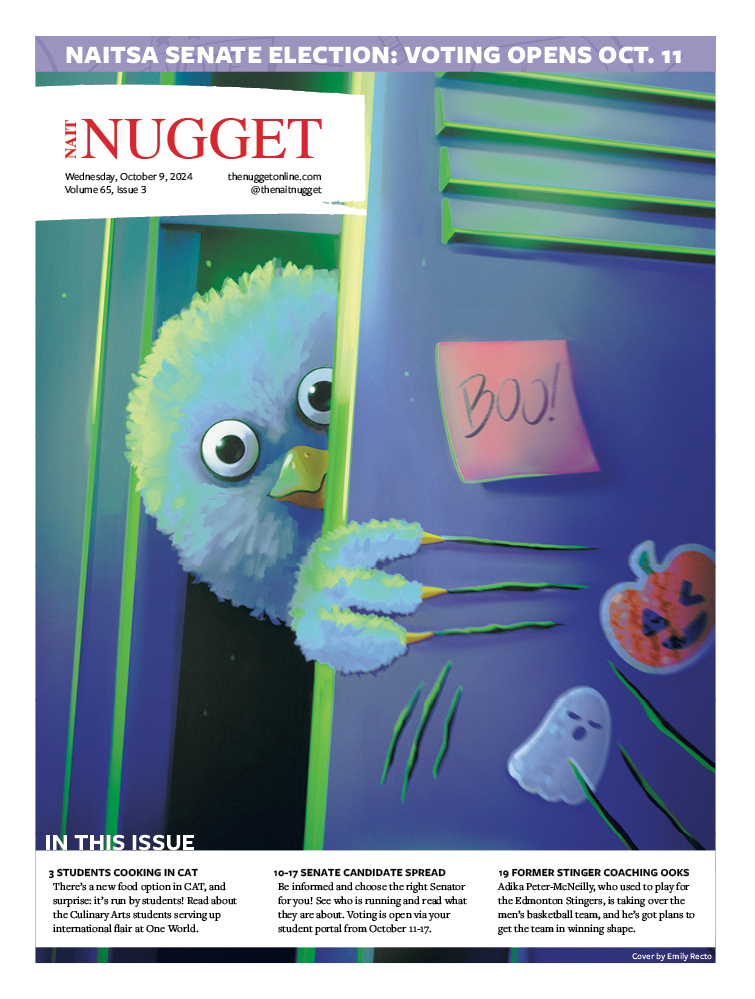By Danielle S. Fuechtmann

Petersen interviewing Robert Plant 1971. Supplied photo.
Holger Petersen’s high school guidance counselor recommended that he apply for NAIT’s Dental Technology program.
Luckily, Petersen left the meeting with a copy of the course catalogue to flip through. As soon as he saw the listing for the Radio and Television Arts program, he knew that was what he wanted to do. Even in 1968, the program’s second year, getting in was competitive, but he managed to snag one of the coveted spots.
Petersen soon sought out more opportunities to get involved at NAIT and in the industry. A drummer in local band Hot Cottage, he found himself behind the mic as the new music director for NAIT radio, and with a page in every issue of the Nugget to write about music.
These early opportunities opened a lot of doors, he said. Unlike today, setting up interviews didn’t require much if you knew the promoter, so once Petersen got started he soon found himself interviewing just about everyone that came through Edmonton, starting with Spencer Davis, and then soon including Led Zeppelin, Dusty Springfield and Pink Floyd, among others.
One afternoon, still in the fall of 1968, Petersen picked up the phone and made a call. He’d been listening to CKUA, particularly Tony Dillon Davis’ freeform show, and had decided to call Davis out of the blue; after a few minutes of conversation about what Petersen was doing at NAIT with radio and the Nugget, Davis invited him to come down to the station.
Thanks to Davis’ generosity, Petersen found himself hanging out at CKUA on the weekends and before he knew it, his interviews for the NAIT Nugget were being aired on Davis’s show and eventually program director Ed Kilpatrick, knowing that Petersen was into the blues, asked him if he’d be interested in hosting a blues show.
In 1969, Natch’l Blues went on the air at CKUA for the first time. He’s proudly still doing the show.
Petersen’s been capturing the stories and legacies of generations of artists ever since; getting it down before it’s lost.
“These guys aren’t going to be around forever. It’s really important to get their stories down, you know…Time just kind of moves on but the relevance of what people have done is still there and I think it’s important to get it down. And not only just the musicians, but the other people in the industry who were part of that, like the Alan Lomaxes, and the Dick Watermans, and the Bruce Gowers and people who are behind the scenes but if it wasn’t for them…we wouldn’t have all this great music to listen to.”

Supplied photo.
Continuing to play drums with local blues band Hot Cottage into the beginning of the 70s, Petersen found himself increasingly drawn to the production side of music. Eventually he left the band and focused on spending more time in recording studios. Petersen started establishing contacts and recording records, diving deeper into the blues and discovering that many of the artists were still around–albeit in their sixties and seventies–but not getting the recording attention they deserved. He began to bring them up to record a record and play some gigs in the province.
These early records needed someone to release them and, for a while, Petersen worked with a couple of record companies to license the recordings. But by 1975, he realized that he was doing all the work, producing records, doing the covers, writing the liner notes and then giving it to someone else to release.
So he partnered up with a former bandmate and friend, chartered accountant Alvin Jahns, starting Stony Plain Records. They released their first record that spring with local singer-songwriter Paul Hann.
Stony Plain Records continued to prove that excellent music production happens outside of the iconic music capitals. Signing only a couple of new artists each year, they have released around 410 titles representing some of the best in roots, rock, country, folk and blues.
Things really took off when Ian Tyson signed with Stony Plain Records to release Cowboyography, which would go on to reach gold and platinum, giving the humble prairie label its first hits.
Petersen says the key things he looks for when signing a new artist is feeling you’re on the same page about the music, a strong sense of identity for the artist and that they believe in what they’re doing and that they’ve spent a lot of time listening to music, really honing their craft. It’s criteria that has developed a successful label.
With 50 years in the music and journalism industry, he’s had a front row seat to a lot of changes, particularly as digital platforms have been racing to redevelop both industries. It’s become incredibly difficult to cover the costs of creating music he says, particularly for independent artists. Attending gigs and stopping at the merch table is a huge way to support your favourite artists, he says. “That’s a really rewarding experience because, generally, you have a chance to meet the artists.”

Petersen in 2015. Supplied photo.
Although the industry continues to evolve, one thing has remained constant is he’s still supporting the music he loves and that inspires him.
“I’m still a record collector, always have been, always will be. And I love that part of it because it’s an ongoing education, you know,” said Petersen.
In addition to his work in radio and with Stony Plain Records, Petersen was also a founder of the Edmonton Folk Music Festival, a director of SOCAN (Society of Composers, Authors and Music Publishers of Canada) and a founding member of the Alberta Recording Industries Association. He’s been awarded honorary degrees from Athabasca University and the University of Alberta. In 2003, he was inducted into the Order of Canada.
“I also found that people like to talk about what they love, you know, and usually most people don’t want to talk about themselves as much as they want to talk about their mentors or their influences or you know, what they’re listening to and, or, you know, something to do with the history of the music or whatever.”





